The Evening School of Business Administration
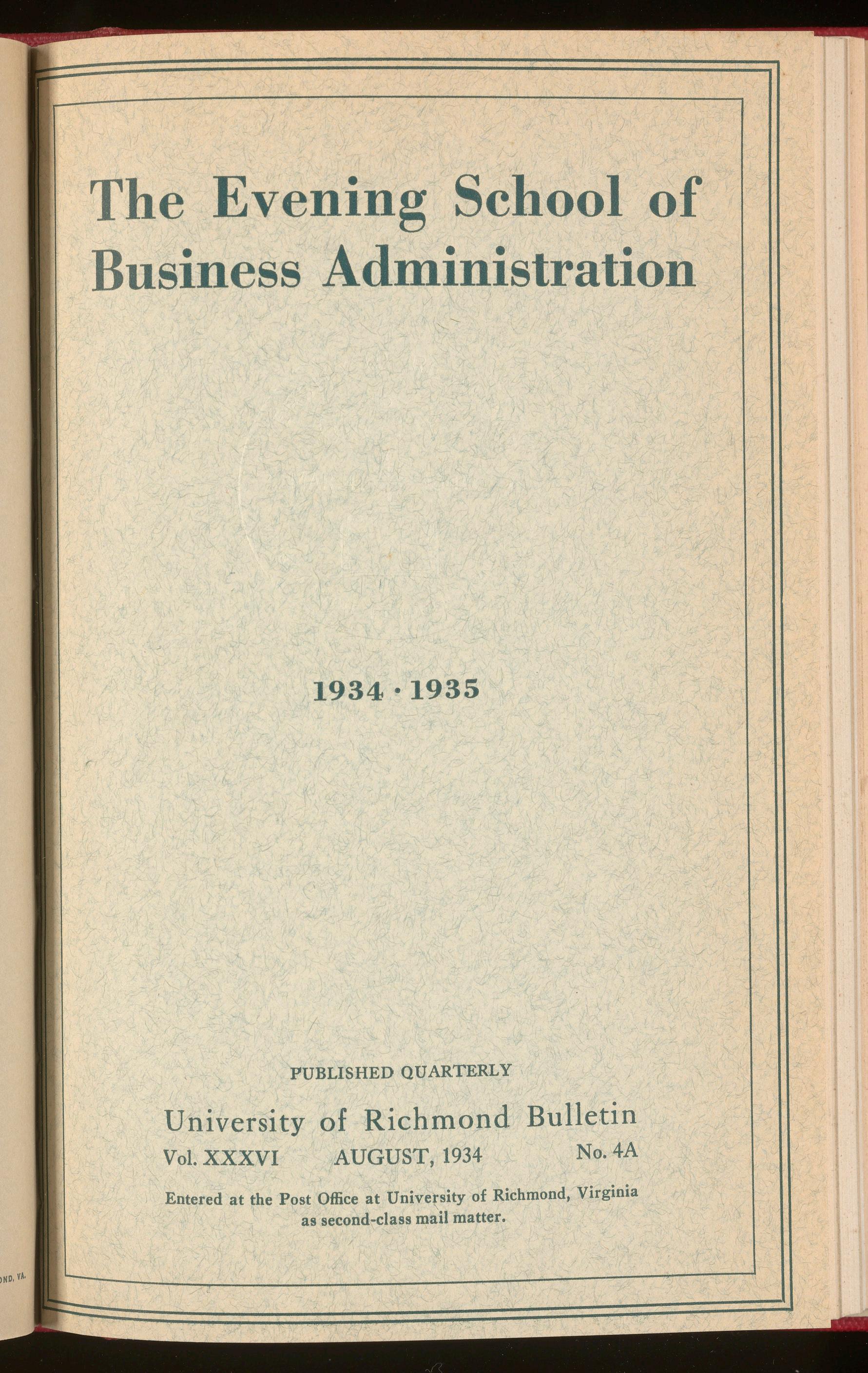
AUGUST, 1934 No. 4A
Entered at the Post Office at University of Richmond, Virginia as second-class mail matter.


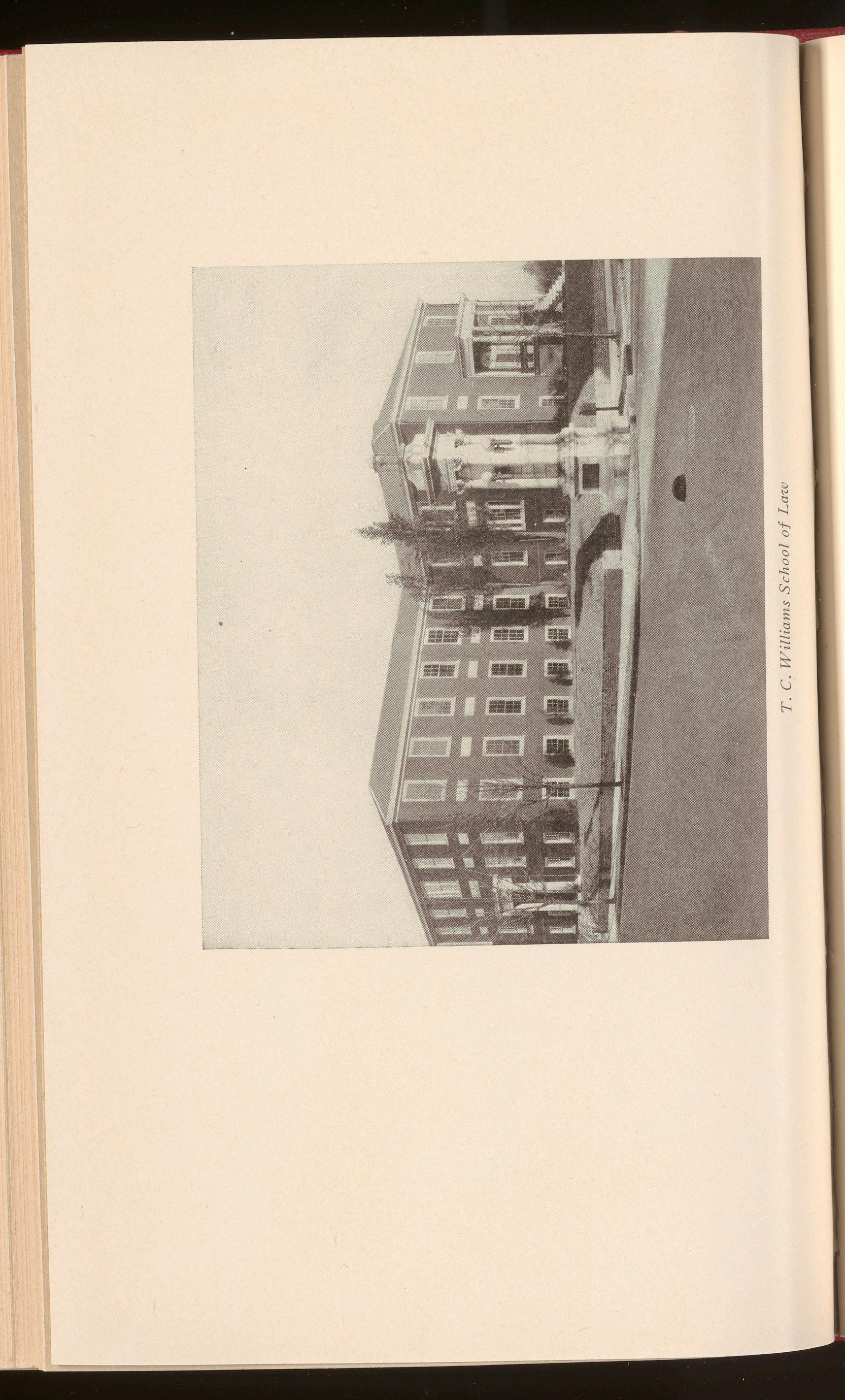


AUGUST, 1934 No. 4A
Entered at the Post Office at University of Richmond, Virginia as second-class mail matter.



SESSION OF 1934-1935

Registration begins Thursday, September 20, 1934
Classes begin Monday, September 24, at 7:30 P. M.
All classes m eet in building of T. C. Williams Law School-Lombardy and Grace Streets FOR INFORMATION ADDRESS
JOHN J. CORSON , III., Director 601 North Lombardy Street Richmond, Va.
T. COLEMAN ANDREWS
JOHN STEWART BRYAN
NORMAN CALL
JOHN B. CARY
DOUGLAS s. FREEMAN
CHESLEY s. GOLDSTON
JACK G. HOLTZCLAW
LUTHER H. JENKINS
J. AMBLER JOHNSTON
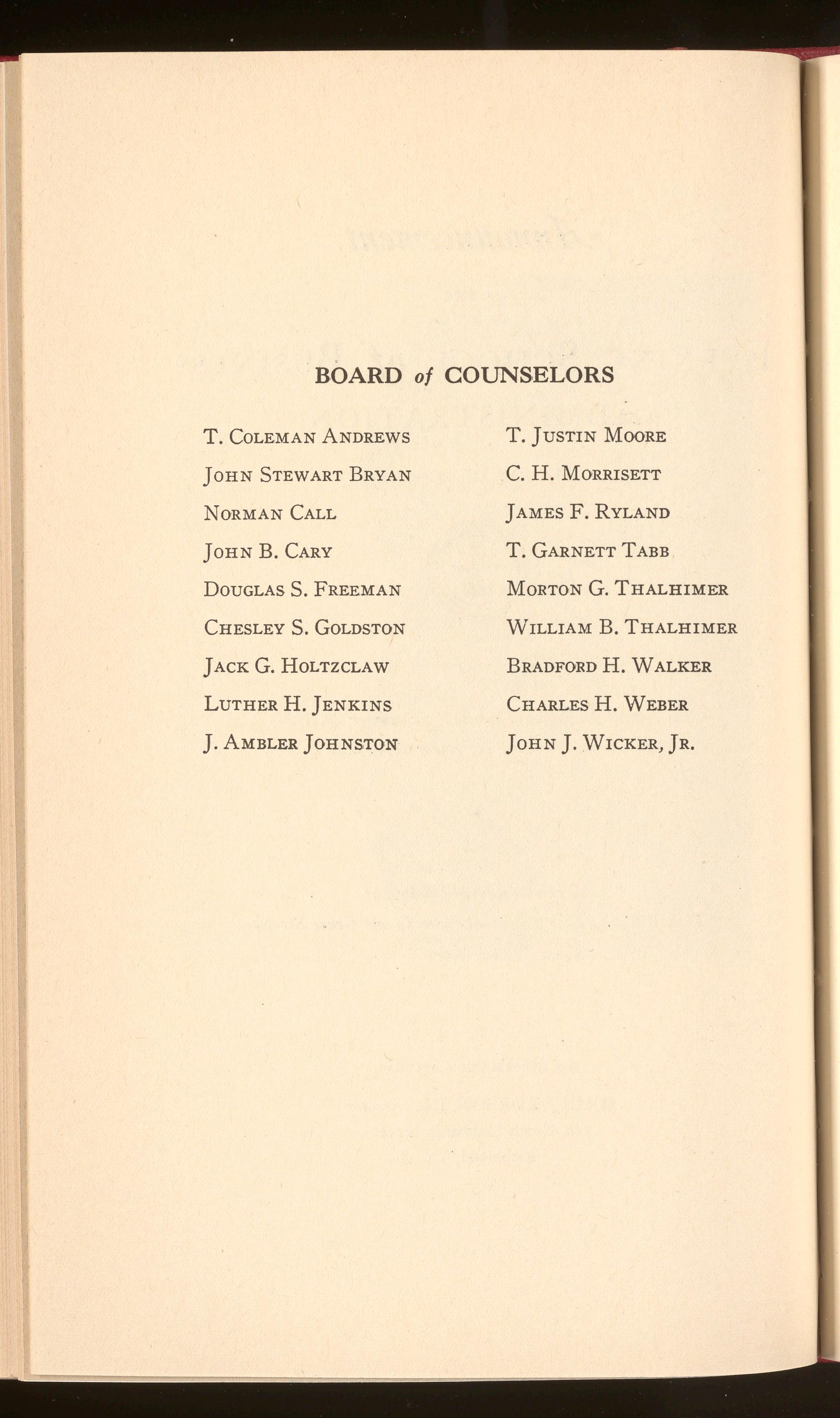
T. ] USTIN MOORE
C. H. MoRRISETT
JAMES F. RYLAND
T. GARNETT TABB
MORTON G. THALHIMER
WILLIAM B. THALHIMER
BRADFORD H. w ALKER
CHARLES H. WEBER
JOHN]. WICKER, JR.
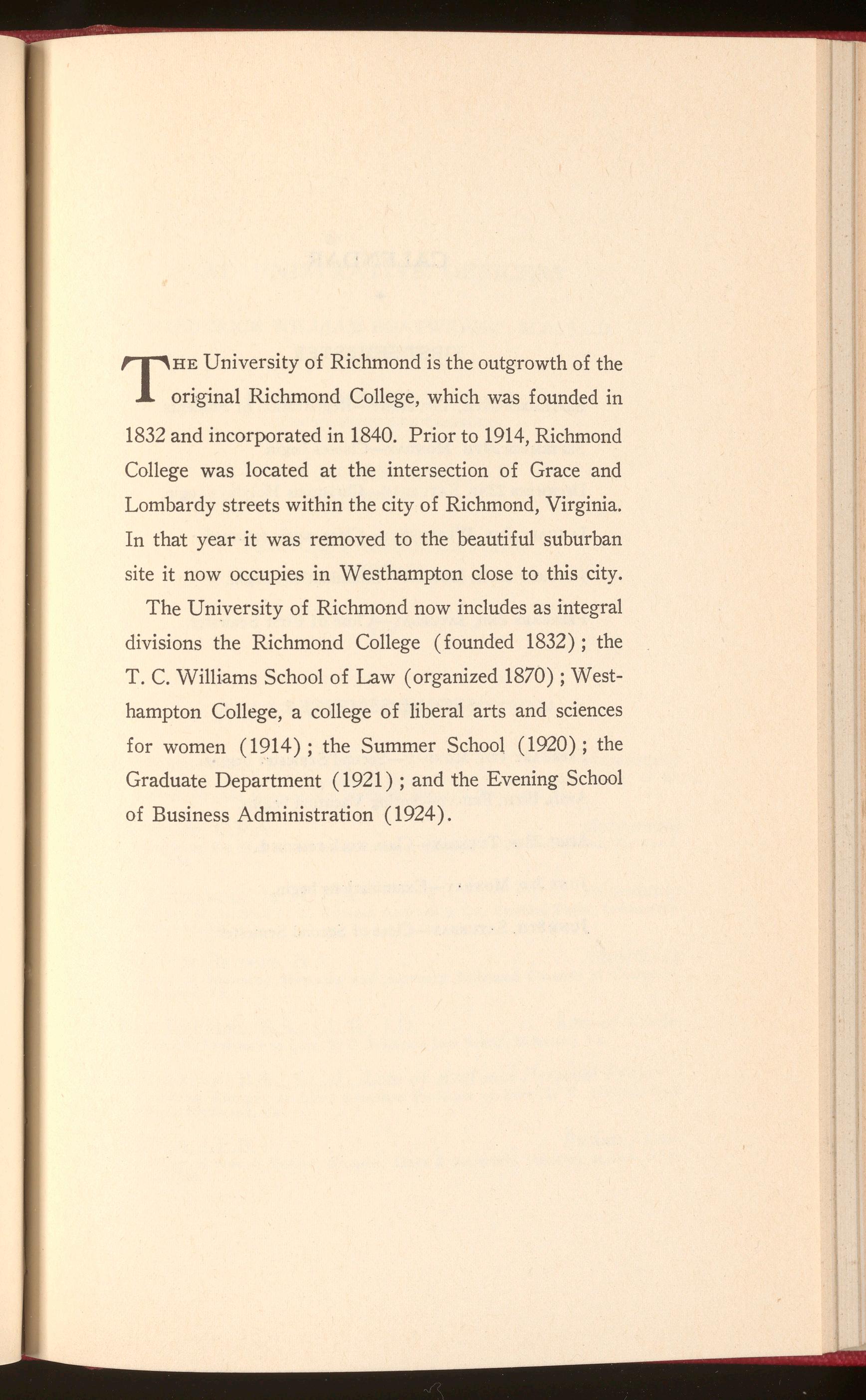
THE University of Richmond is the outgrowth of the original Richmond College, which was founded in 1832 and incorporated in 1840. Prior to 1914, Richmond College was located at the intersection of Grace and Lombardy streets within the city of Richmond, Virginia. In that year it was removed to the beautiful suburban site it now occupies in Westhampton close to this city. The University of Richmond now includes as integral divisions the Richmond College ( founded 1832) ; the T. C. Williams School of Law (organized 1870); Westhampton College, a college of liberal arts and sciences for women (1914); the Summer School (1920); the Graduate Department ( 1921) ; and the Evening School of Business Administration ( 1924).

SEPTEMBER20TH, THURSDA¥-Registrati on of Students.
SEPTEMBER24TH, MONDAY-Classes begin.
DECEMBER22ND, SATURDAY-Christmas Holidays begin.
JANUARY2ND, WEDNESDAY-Class work resumed.
JANUARY28TH, MONDAY-Examinations begin.
FEBRUARY2ND, SATURDAY-Close of First Semester.
FEBRUARY4TH, MONDAY-Second Semester begins.
APRIL 19TH, FRIDAY-Spring Vacation begins.
APRIL 23RD,TUESDAY-Class work resumed.
JUNE 3RD,MONDAY-Examinations begin.
JuNE8TH, SATURDAY-Close of Second Semester.
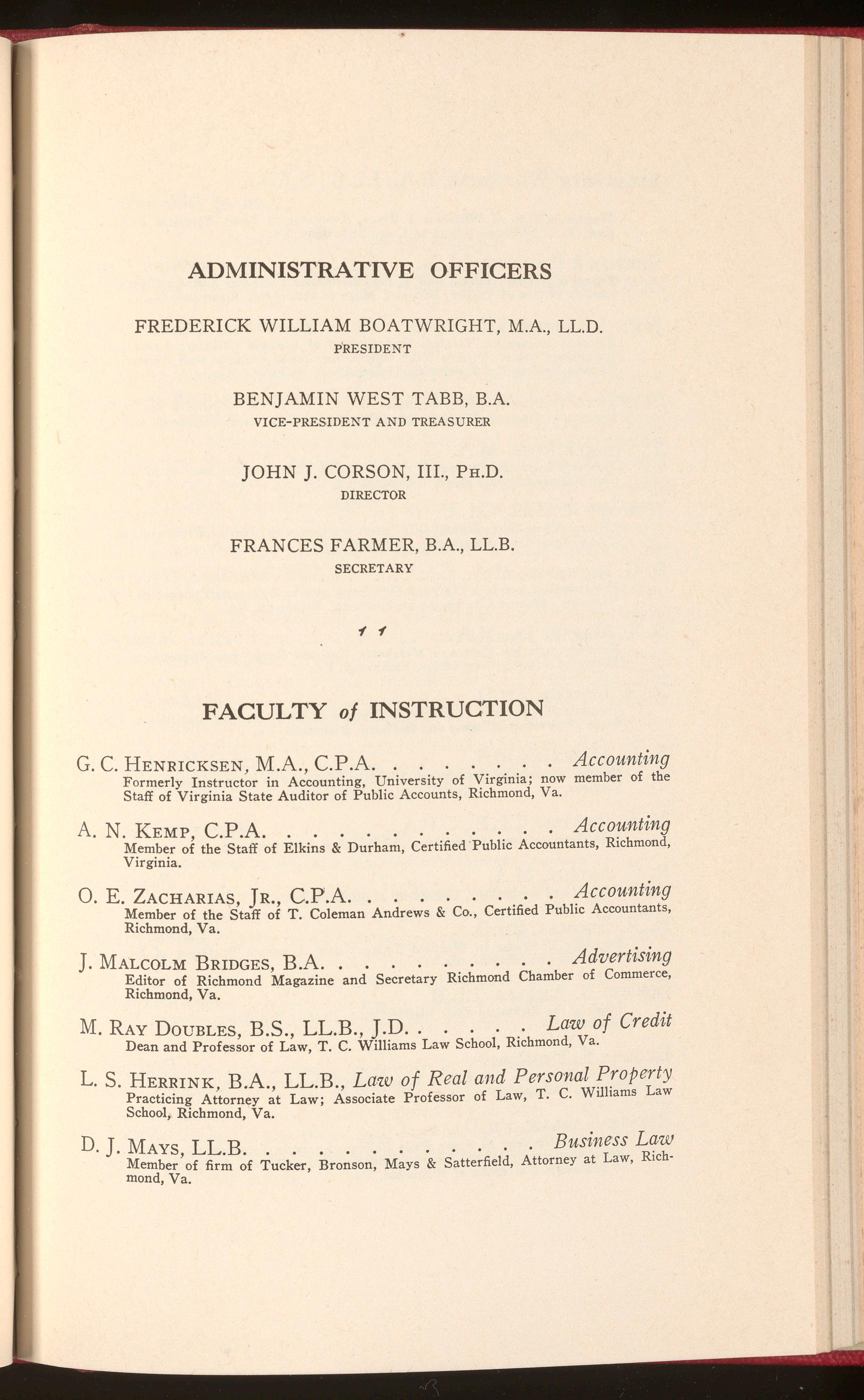
FREDERICK WILLIAM BOATWRIGHT, M.A., LL.D. PRESIDENT
BENJAMIN WEST TABB, B.A. VICE-PRESIDENT AND TREASURER
JOHN ]. CORSON, III., PH.D. DIRECTOR
FRANCES FARMER, B.A., LL.B. SECRETARY
G. C. HENRICKSEN, M.A., C.P.A. . . • Accounting Formerly Instructor in Accounting, University of Virginia; now member of the Staff of Virginia State Auditor of Public Accounts, Richmond, Va.
A. N. KEMP, C.P.A.
Accounting Member of the Staff of Elkins & Durham, Certified Public Accountants, Richmond, Virginia.
0. E. ZACHARIAS, JR., C.P.A.
Accounting Member of the Staff of T. Coleman Andrews & Co., Certified Public Accountants, Richmond, Va.
J. MALCOLM BRIDGES, B.A.
Advertising Editor of Richmond Magazine and Secretary Richmond Chamber of Commerce, Richmond, Va.
M. RAY DOUBLES, B.S., LL.B., J.D.
Law of Credit Dean and Professor of Law, T. C. Williams Law School, Richmond, Va.
L. S. HE~RINK, B.A., LL.B., Law of Real and Personal P:operty Practicing Attorney at Law· Associate Professor of Law, T. C. Wilhams Law School, Richmond, Va. '
D. J. MAYS, LL.B.
Business Lq,w Member of firm of Tucker, Bronson, Mays & Satterfield, Attorney at Law, Richmond, Va.
ELLSWORTH WILTSHIRE, B.A., LL.B., S.J.D., Law of Bills and N ates
Member of firm of Wiltshire & Rives, Attorneys at Law; Associate Professor of Law, T. C. Williams School of Law, Richmond, Va.
SHERLOCK BRONSON, LL.B.. Corporation Finance
Formerly member of legal staff of the Chesapeake and Ohio Railway Company, now member of firm of Tucker, Bronson, Mays & Satterfield, Richmond, Va.
JoHN J. CORSON, III., PH.D. • • Economics, Public Utilities ·Formerly Economist, Virginia Investigation of Electric Utilities; Associate Labor Compliance Officer, Virgina NRA Offices; member of editorial staff Richmond News Leader; Professor of Economics, University of Richmond, Va.
CLARENCE W. NEWMAN, B.A. • Econo1nic Geography Director of Research, Virginia State Chamber of Commerce, Richmond, Va.
T. TURNER RosE, M.A. English
Formerly Instructor in English, University of Virginia; now member of the staff of The Richmond News Leader, Richmond, Va.
HERBERT R. HILL, C.L.U. . Insurance
General Al!"ent, State Mutual Life Insurance Company; former President, Richmond Life Underwriters Association, Richmond, Va.
R. G. RICHARDS, M.A., C.L.U. • Life Insurance, Government Formerly Instructor in Harvard University and in Lafayette College; now Agency Secretary, Atlantic Life Insurance Company, Richmond, Va.
R. T. MARSH, JR., M.A. • Investments Formerly with the First and Merchants National Bank; now Investment Analyst, Dominion Security Corporation, Richmond, Va.
R. H. BARKER, PH.D. •
• Labor Problems Formerly Instructor in Sociology, University of Virginia; now Statistician, Virginia State Department of Labor and Industry, Richmond, Va.
E. M. HAWKINS, B.S. Retail Merchandising Member of the sales department, Virginia Electric and Power Company, Richmond, Virginia.
M. E. BRISTOW, LL.B., C.P.A.
• Money and Banking State Commissioner of Insurance and Banking, Richmond, Va.
R. C. AsTROP, M.A. Professor of Psychology, University of Richmond, Va. Psychology
H. P. THOMAS, PH.D. Public Finance
Formerly Professor in Bluefield College; now Associate Professor of Economics, University of Richmond, Va.
GoRDON B. AMBLER, LL.B.
Public Speaking Judge of the Richmond Civil Justice Court, Part I; Practicing Attorney, Richmond, Virginia.
EUGENE S. DEsPoRTES Real Estate
Formerly Agency Supervisor, Penn Mutual Insurance Company; now Practicing Realtor, Richmond, Va.
RoLvrx HARLAN, PH.D..

Sociology
Formerly President of Sioux Falls College, formerly Secretary Social Service and Rural Community Work, American Baptist Home Mission Society; now Professor of Sociology, University of Richmond, Va.
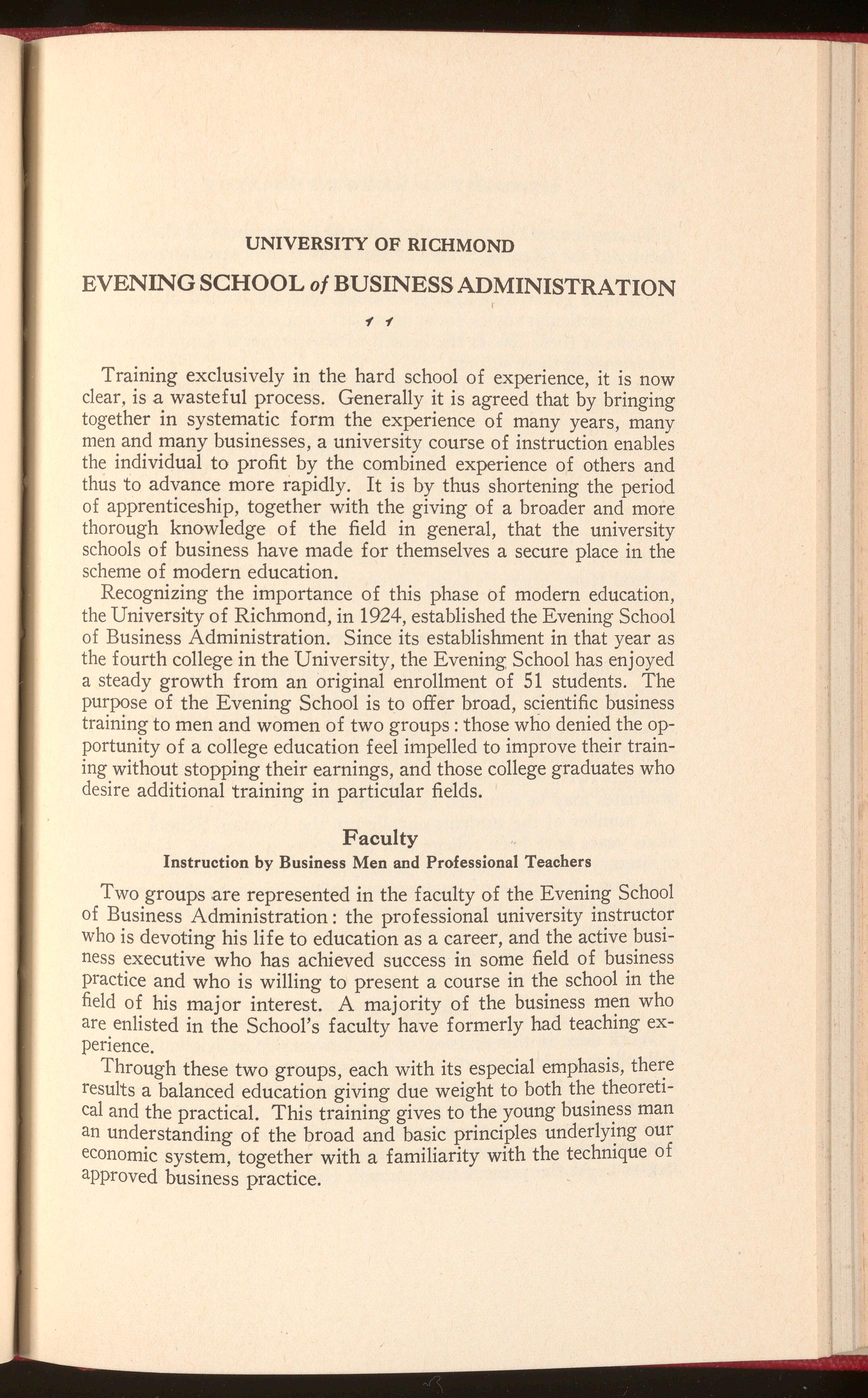
Training exclusively in the hard school of experience, it is now clear, is a wasteful process. Generally it is agreed that by bringing together in systematic form the experience of many years, many men and many businesses, a university course of instruction enables the individual to profit by the combined experience of others and thus to advance more rapidly. It is by thus shortening the period of apprenticeship, together with the giving of a broader and more thorough knowledge of the field in general, that the university schools of business have made for themselves a secure place in the scheme of modern education.
Recognizing the importance of this phase of modern education, the University of Richmond, in 1924, established the Evening School of Business Administration. Since its establishment in that year as the fourth college in the University, the Evening , School has enjoyed a steady growth from an original enrollment of 51 students. The purpose of the Evening School is to offer broad, scientific business training to men and women of two groups: those who denied the opportunity of a college education feel impelled to improve their training without stopping their earnings, and those college graduates who desire additional training in particular fields.
Two groups are represented in the faculty of the Evening School of Business Administration: the professional university i~struct~r who is devoting his life to education as a career, and the active business executive who has achieved success in some field of business practice and who is willing to present a course in the school in the field of his major interest. A majority of the business m~n who are enlisted in the School's faculty have formerly had teaching experience.
Through these two groups, each with its especial emphasis, the~e results a balanced education giving due weight to both th~ theoretical and the practical. This training gives to the young busm~ss man an understanding of the broad and basic principles underly~ng our economic system, together with a familiarity with the techmque of approved business practice.
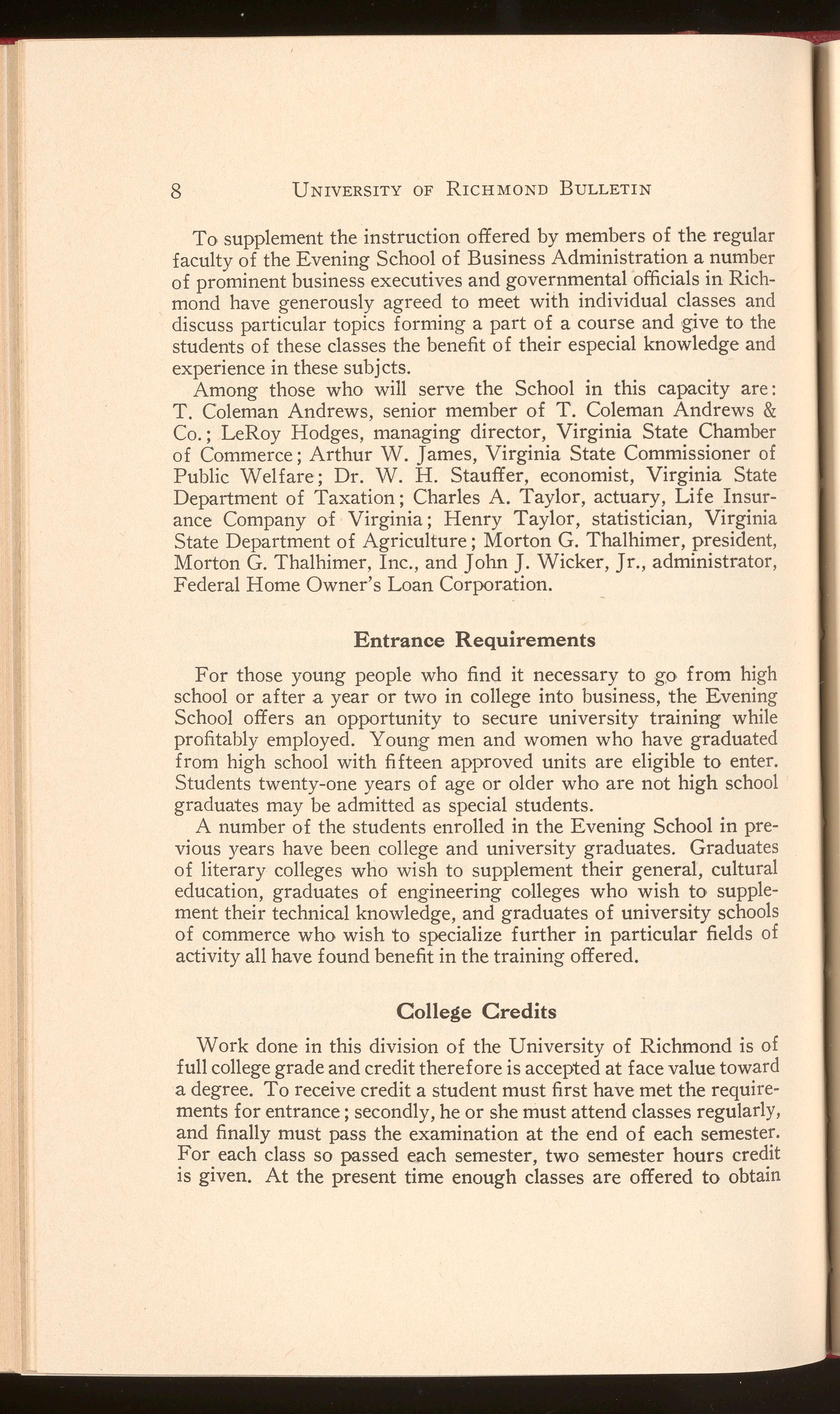
To supplement the instruction offered by members of the regular faculty of the Evening School of Business Administration a number of prominent business executives and governmental officials in Richmond have generously agreed to meet with individual classes and discuss particular topics forming a part of a course and ,give to the students of these classes the benefit of their especial knowledge and experience in these subjcts.
Among those who will serve the School in this capacity are: T. Coleman Andrews, senior member of T. Coleman Andrews & Co.; LeRoy Hodges, managing director, Virginia State Chamber of Commerce; Arthur W. James, Virginia State Commissioner of Public Welfare; Dr. W. H. Stauffer, economist, Virginia State Department of Taxation; Charles A. Taylor, actuary, Life Insurance Company of Virginia; Henry Taylor, statistician, Virginia State Department of Agriculture; Morton G. Thalhimer, president , Morton G Thalhimer, Inc., and John J. Wicker, Jr., administrator, Federal Home Owner's Loan Corporation.
For those young people who find it necessary to go from high school or after a year or two in college into business, the Evenin g School offers an opportunity to secure university training while profitably employed. Young men and women who have graduated from high school with fifteen approved units are eligible to enter. Students twenty-one years of age or older who are not high school graduates may be admitted as special students.
A number of the students enrolled in the Evening School in previous years have been college and university graduates. Graduate s of literary colleges who wish to supplement their general, cultural education, graduates of engineering colleges who wish to supplement their technical knowledge, and graduates of university schools of commerce who wish to specialize further in particular fields of activity all have found benefit in the training offered.
Work done in this division of the University of Richmond is of full college grade and credit therefore is accepted at face value toward a degree. To receive credit a student must first have met the requirements for entrance; secondly, he or she must attend classes regularly , and finally must pass the examination at the end of each semester. For each class so passed each semester, two semester hours credit is given. At the present time enough classes are offered to obtain
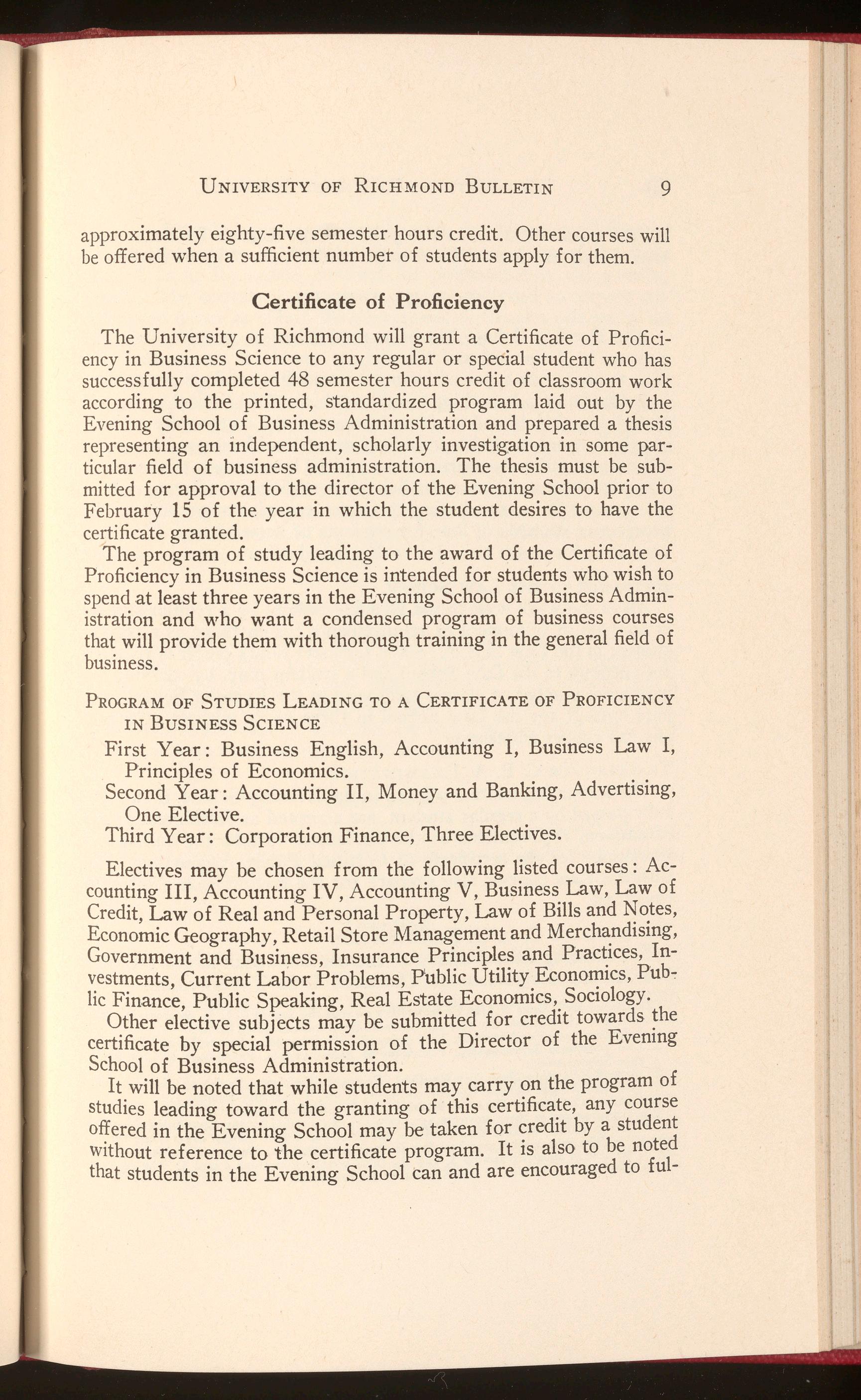
approximately eighty-five semester hours credit. Other courses will be offered when a sufficient number of students apply for them.
The University of Richmond will grant a Certificate of Proficiency in Business Science to any regular or special student who has successfully completed 48 semester hours credit of classroom work according to the printed, standardized program laid out by the Evening School of Business Administration and prepared a thesis representing an independent, scholarly investi-gation in some particular field of business administration. The thesis must be submitted for approval to the director of the Evening School prior to February 15 of the year in which the student desires to have the certificate granted.
The program of study leading to the award of the Certificate of Proficiency in Business Science is intended for students who wish to spend at least three years in the Evening School of Business Administration and who want a condensed program of business courses that will provide them with thorough training in the general field of business.
PROGRAM OF STUDIES LEADING TO A CERTIFICATE OF PROFICIENCY IN BUSINESS SCIENCE
First Year: Business English, Accounting I, Business Law I, Principles of Economics.
Second Year: Accounting II, Money and Banking, Advertising, One Elective.
Third Year : Corporation Finance, Three Electives.
Electives may be chosen from the following listed courses: Accounting III, Accounting IV, Accounting V, Business Law, Law of Credit, Law of Real and Personal Property, Law of Bills and Notes, Economic Geography, Retail Store Management and Merch~ndising, Government and Business, Insurance Principles and Practices, Investments, Current Labor Problems, Public Utility Econo~ics, Pubs lie Finance, Public Speaking, Real Estate Economics,_Soc10logy.
Other elective subjects may be submitted for credit towards ~he certificate by special permission of the Director of the Evemng School of Business Administration.
It will be noted that while students may carry on the program of studies leading toward the granting of this certifica~e, any course o~ ered in the Evening School may be taken for 7red1t by a student without reference to the certificate program. It 1s also to be noted that students in the Evening School can and are encouraged to ful-
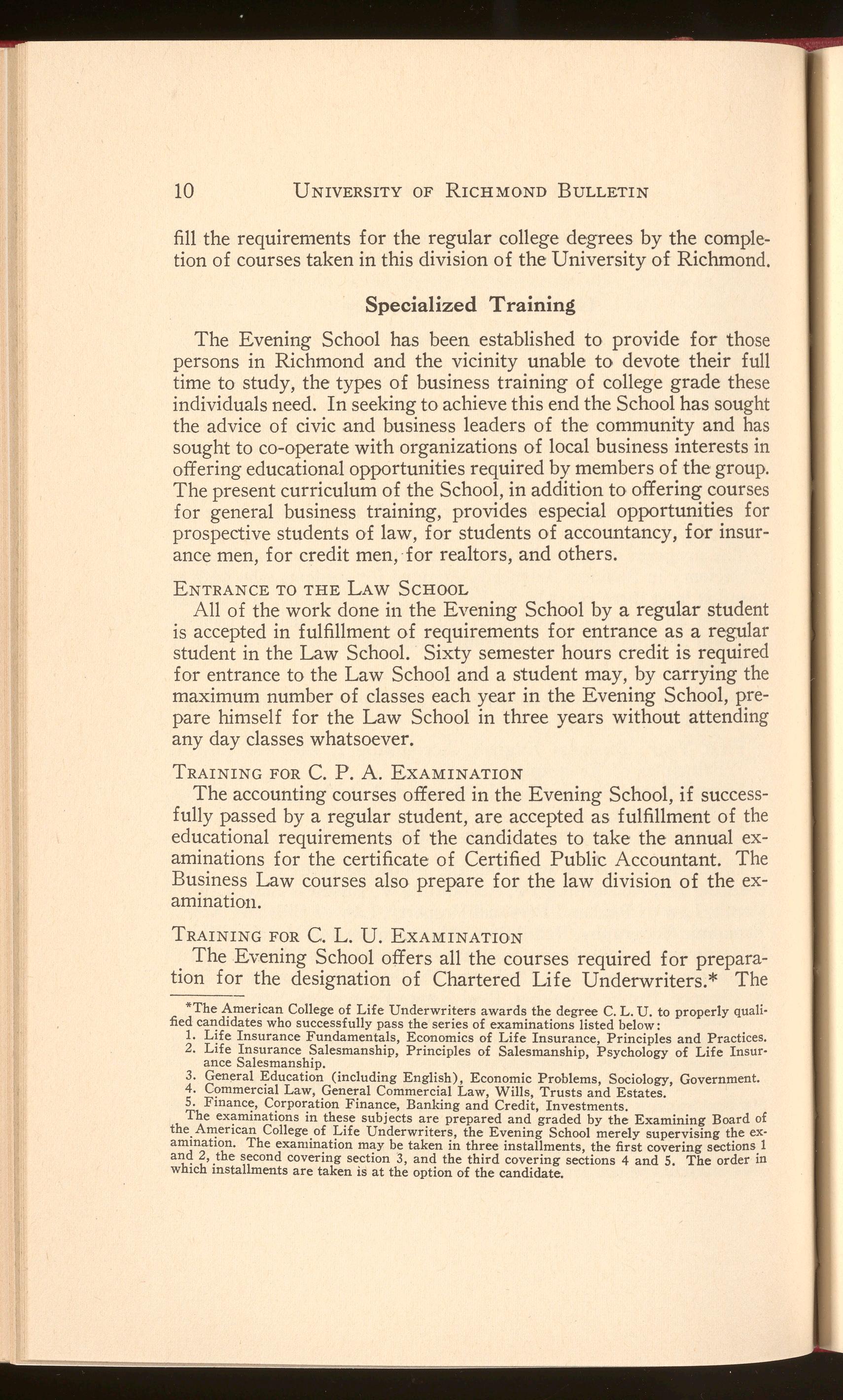
OF RICHMOND BULLETIN
fill the requirements for the regular college degrees by the completion of courses taken in this division of the University of Richmond.
The Evening School has been established to provide for those persons in Richmond and the vicinity unable to devote their full time to study, the types of business training of college grade these individuals need. In seeking to achieve this end the School has sought the advice of civic and business leaders of the community and has sought to co-operate with organizations of local business interests in offering educational opportunities required by members of the group. The present curriculum of the School, in addition to offering courses for general business training, provides especial opportunities for prospective students of law, for students of accountancy, for insurance men, for credit men, for realtors, and others.
ENTRANCE TO THE LAW SCHOOL
All of the work done in the Evening School by a regular student is accepted in fulfillment of requirements for entrance as a regular student in the Law School. Sixty semester hours credit is required for entrance to the Law School and a student may, by carrying the maximum number of classes each year in the Evening School, prepare himself for the Law School in three years without attending any day classes whatsoever.
TRAINING FOR C. P.A. EXAMINATION
The accounting courses offered in the Evening School, if successfully passed by a regular student, are accepted as fulfillment of the educational requirements of the candidates to take the annual examinations for the certificate of Certified Public Accountant. The Business Law courses also prepare for the law division of the examination.
. The Evening School offers all the courses required for preparation for the designation of Chartered Life Underwriters.* The
*The American College of Life Underwriters awards the degree C. L. U. to properly quali• fied c~didates who successfully pass the series of examinations listed below:
I. Life Insurance Fundamentals, Economics of Life Insurance, Principles and Practices.
2. Life Insurance Salesmanship, Principles of Salesmanship, Psychology of Life Insurance Salesmanship.
3. General ~ducation (including Eng!i_sh), Economic Problems, Sociology, Government.
4. C?mmercial Law, 9ene~al Commercial Law, Wills, Trusts and Estates.
5. Fmanct;, C?rporation Finance, Banking and Credit, Investments.
The ex'.'mmahons in the~e subjects are prepared and graded by the Examining Board of the_Amencan College_of ~ife Underwriters, the Evening School merely supervising the ex· ammat10n. The exan11nat10nmay be taken in three installments, the first covering sections 1 an~ 2, _the second covering section 3, and the third covering sections 4 and S. The order in which installments are taken is at the option of the candidate.
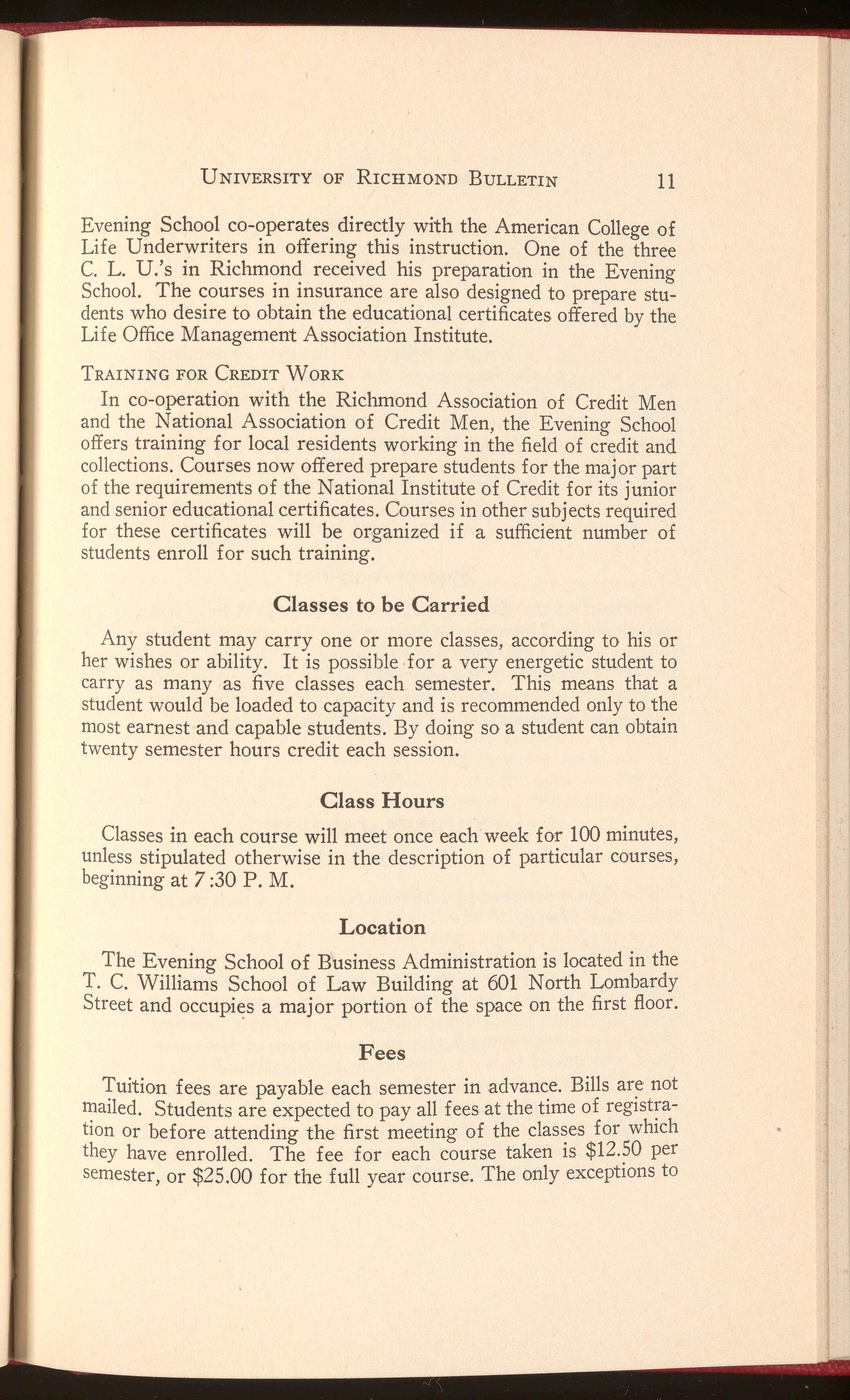
Evening School co-operates directly with the American College of Life Underwriters in offering this instruction. One of the three C. L. U.'s in Richmond received his preparation in the Evening School. The courses in insurance are also designed to prepare students who desire to obtain the educational certificates offered by the Life Office Management Association Institute.
In co-operation with the Richmond Association of Credit Men and the National Association of Credit Men, the Evening School offers training for local residents working in the field of credit and collections. Courses now offered prepare students for the major part of the requirements of the National Institute of Credit for its junior and senior educational certificates. Courses in other subjects required for these certificates will be organized if a sufficient number of students enroll for such training.
Any student may carry one or more classes, according to his or her wishes or ability. It is possible for a very energetic student to carry as many as five classes each semester. This means that a student would be loaded to capacity and is recommended only to the most earnest and capable students. By doing so a student can obtain twenty semester hours credit each session.
Classes in each course will meet once each week for 100 minutes, unless stipulated otherwise in the description of particular courses, beginning at 7 :30 P. M.
The Evening School of Business Administration is located in the T. C. Williams School of Law Building at 601 North Lombardy Street and occupies a major portion of the space on the first floor.
~uition fees are payable each semester in advan~e. Bills ar~ not mailed. Students are expected to pay all fees at the time of reg1st~ation or before attending the first meeting of the classes for which they have enrolled. The fee for each course taken is $12.?0 per semester, or $25.00 for the full year course. The only exceptions to

this general tuition fee are for the classes in Accounting IV and Accounting V. The tuition fee for Accounting IV is $15.00 per semester, for Accounting V, $20.00 per semester.
Students in the Evening School of Business Administration are given access to the facilities of the library of this division of the University of Richmond and as well to the library facilities of other divisions of the University. A large reading room and a specialized library of about 500 standard volumes dealing with economic topics and current economic material are maintained especially for the use of students of the Evening School. Students are encouraged to broaden the scope of their training by the use of current periodical and pamphlet material made available in the School library.
Students of the Evening School of Business Administration are students of the University of Richmond. The traditions of the other colleges of the University are well known in the city. Tradition is present in the spirit of the personnel of this college also and it is the policy of the administration and faculty to foster any proper organizations and activities that the students should undertake .
For 1934-1935
The right is reserved to withdraw courses in which the enrollment is less than fifteen.
AccouNTING I. Fundamentals of Accounting.-This course is intended to provide an introduction to the science of accounting for those ( 1) who seek the business executive's approach to an understanding of business administration, (2) for those desiring the elements of accounting applicable in the practice of law, and ( 3) for those who intend to lay a foundation for accountancy as a profession. The study, although suited to the needs of beginners, advances rapidly through the principles of debit and credit and other routine of double entry bookkeeping to the construction from the trial balance of the balance sheet and the statement of profit and loss. Principles of interpretation of balance sheet and income statements of
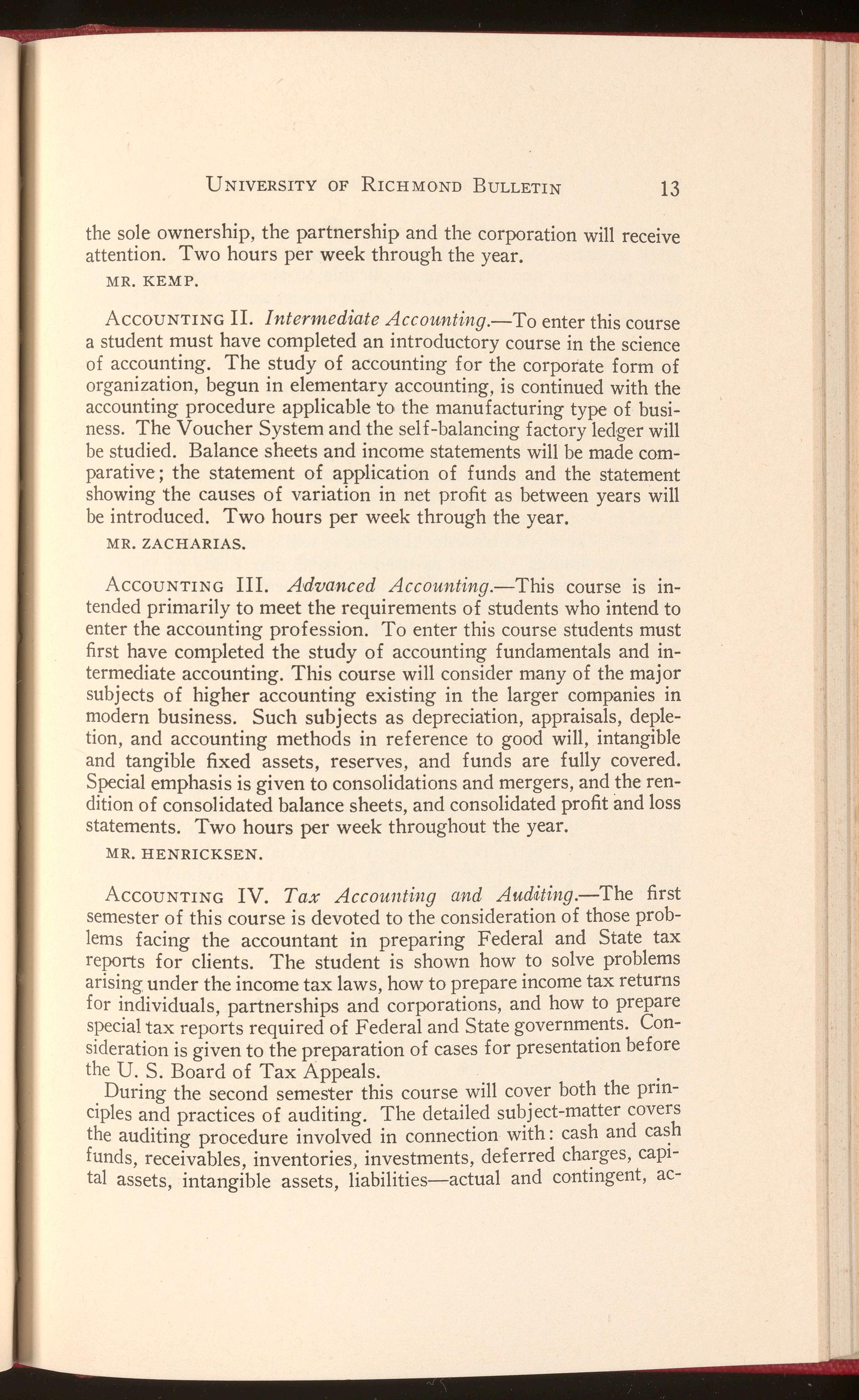
the sole ownership, the partnership and the corporation will receive attention. Two hours per week through the year.
MR. KEMP.
AccouNTING IL Intermediate Accoimting.-To enter this course a student must have completed an introductory course in the science of accounting. The study of accounting for the corporate form of organization, begun in elementary accounting, is continued with the accounting procedure applicable to the manufacturing type of business. The Voucher System and the self-balancing factory ledger will be studied. Balance sheets and income statements will be made comparative; the statement of application of funds and the statement showing the causes of variation in net profit as between years will be introduced. Two hours per week through the year.
MR. ZACHARIAS.
AccouNTING III. Advanced Accounting.-This course is intended primarily to meet the requirements of students who intend to enter the accounting profession. To enter this course students must first have completed the study of accounting fundamentals and intermediate accounting. This course will consider many of the major subjects of higher accounting existing in the larger companies in modern business. Such subjects as depreciation, appraisals, depletion, and accounting methods in reference to good will, intangible and tangible fixed assets, reserves, and funds are fully covered. Special emphasis is given to consolidations and mergers, and the rendition of consolidated balance sheets, and consolidated profit and loss statements. Two hours per week throughout the year.
MR. HENRICKSEN.
AccouNTING IV. Tax Accounting and Auditing.-The first semester of this course is devoted to the consideration of those problems facing the accountant in preparing Federal and State tax reports for clients. The student is shown how to solve problems arising under the income tax laws, how to prepare income tax returns for individuals, partnerships and corporations, and how to prepare special tax reports required of Federal and State governments. Consideration is given to the preparation of cases for presentation before the U. S. Board of Tax Appeals. . During the second semester this course will cover both the prmciples and practices of auditing. The detailed subject-matter covers the auditing procedure involved in connection with: cash and ca~h funds receivables inventories investments, deferred charges, capital as'sets, intangible assets, liabilities-actual and contingent, ac-
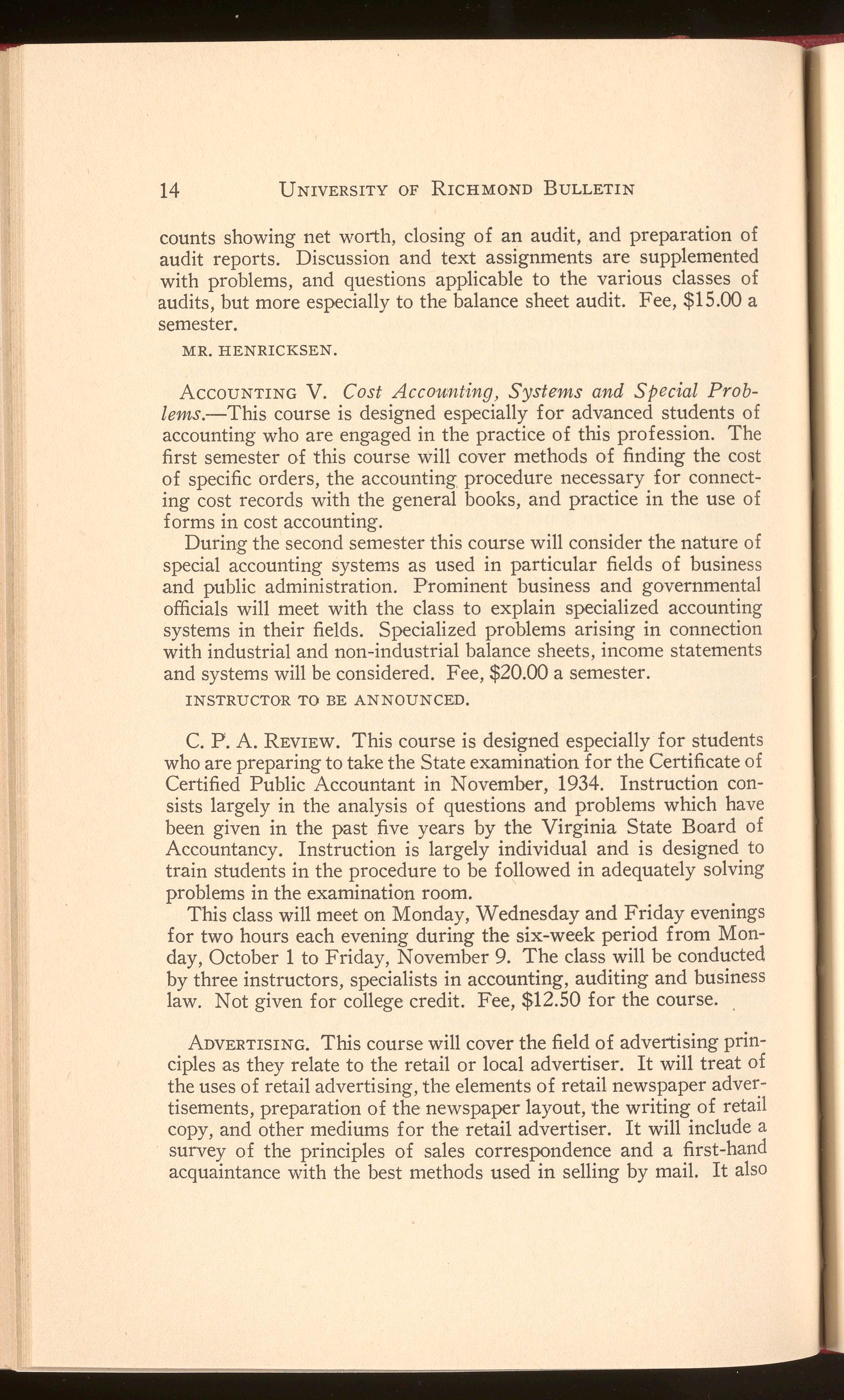
counts showing net worth, closing of an audit, and preparation of audit reports. Discussion and text assignments are supplemented with problems, and questions applicable to the various classes of audits, but more especially to the balance sheet audit. Fee, $15.00 a semester.
MR.HENRICKSEN.
ACCOUNTINGV. Cost Accounting, Systems and Special Problenis.-This course is designed especially for advanced students of accounting who are engaged in the practice of this profession. The first semester of this course will cover methods of finding the cost of specific orders, the accounting procedure necessary for connecting cost records with the general books, and practice in the use of forms in cost accounting.
During the second semester this course will consider the nature of special accounting systems as used in particular fields of business and public administration. Prominent business and governmental officials will meet with the class to explain specialized accounting systems in their fields. Specialized problems arising in connection with industrial and non-industrial balance sheets, income statements and systems will be considered. Fee, $20.00 a semester.
INSTRUCTORTO BE ANNOUNCED.
C. P.A. REVIEW. This course is designed especially for students who are preparing to take the State examination for the Certificate of Certified Public Accountant in November, 1934. Instruction consists largely in the analysis of questions and problems which have been given in the past five years by the Virginia State Board of Accountancy. Instruction is largely individual and is designed to train students in the procedure to be followed in adequately solving problems in the examination room.
This class will meet on Monday, \Vednesday and Friday evenings for two hours each evening during the six-week period from Monday, October 1 to Friday, November 9. The class will be conducted by three instructors, specialists in accounting, auditing and business law. Not given for college credit. Fee, $12.50 for the course . .
ADVERTISING.This course will cover the field of advertising principles as they relate to the retail or local advertiser. It will treat of the uses of retail advertising, the elements of retail newspaper advertisements, preparation of the newspaper layout, the writing of retail copy, and other mediums for the retail advertiser. It will include a survey of the principles of sales correspondence and a first-hand acquaintance with the best methods used in selling by mail. It also

treats of national advertising procedure, all classes of advertising mediums, the steps in campaign planning, and cases drawn from actual advertising experience.
MR.BRIDGES.
*BusINESS LA:V· PracticaJly all business relationships have a legal background m that they mvolve some contractual undertaking. Bu~iness law, therefore, c~nstitutes an essential part of training for busmess. A careful study 1s made of those phases of law which are related most closely to the successful conduct of business transactions. The principles of contracts, agency, sales and negotiable instruments receive especial emphasis.
MR.MAYS.
THE LAW OF BILLS ANDNoTES. The ordinary legal problems of banking and bills and notes, including formal requisites; indorsements; rights ; incapacity; illegality; defects and defenses; holding in due course; obligations; discharge; alteration; blanks ; negligence; mistake; identity of payee; diligence.
This course is of particular importance to the man or woman employed in banking or related fields of finance. It is designed to afford the banker or business man a practical, sufficient knowledge of the subject to enable him to act in accordance with legal principles.
MR.WILTSHIRE.
THE LAW OF CREDIT. Problems confronting the secured and unsecured creditor will be discussed, including bankruptcy, statute of limitations, pledges and pawns of personal property, bills of lading, warehouse receipts, conditional sales, letters of credit, guaranties by third persons, mortgages, etc. Special problems raised by members of the class will be covered.
MR.DOUBLES.
THE LAWOFREALANDPERSONALPROPERTY.Methods of acquiring property-deeds, wills, inheritance, statute of limitations, gifts, etc.; estates created-fee simple, life, term for years, etc.; co-tenancy -joint, in comrrion, co-parcenary, and entirety; liei:s-common law, mechanics, judgment, etc.; incorporeal interests m land-:pr_ofits, easements and iicenses; landlord and tenant ; building restnct1ons ; examination of title.
This course is of special importance to those whose work concerns real estate-the realtor, the broker, the insurance agent, the manager
*Prepares for C. L. U. examination.

of an estate. Every business man, however, should have a knowledge of the law of property.
MR.HERRINK.
*CoRPORATIONFINANCE. This is an advanced course dealing with the financial problems confronting business men as a result of the tremendous ,growth in the size of modern industrial organizations. The first semester comprises a study of underlying problems: the place of the corporation in modern business, advantages and dis- advantages of corporate organization, legal organization, corporate promotion, capitalization, types of securities, earnings, expenses and surplus, and insolvency or reorganization. Special emphasis will be given to changing conditions and new problems arising under the Federal Securities Act of 1933.
During the second semester the course is devoted more to the marketing of corporate securities and the functions of underwriting, brokerage houses and the stock exchanges in providing capital funds for various sizes and kinds of corporations.
MR.BRONSON.
*PRINCIPLESOF EcoNOMICS. The aim of this course is to give students an appreciation of the principles underlying business activities of the communites and to enable them to apply sound economic reasoning to the current practical affairs of business life. The follow- ing list is typical of the problems analyzed : consumption, the distribution of wealth, organization of production, value and exchange, money and banking, international trade, labor problems, public finance and social control of business. The discussion will be only moderately technical and the course will include analyses of immediate economic problems resulting from the National Industrial Recovery Administration.
MR. CORSON.
ECONOMICGEOGRAPHY.The business man administers his business under conditions imposed by his physical environment. The student of business administration and particularly students especially interested in the fields of marketing, foreign trade or transportation, hence, should be familiar with the principles of economic geography. This course is designed to afford the student an understanding of the economic geography of North America, and par- . ticularly of the geographic bases of inter-regional and international trade in the United States and in Virginia.
MR.NEWMAN.
*Prepares for C. L. U. examination.
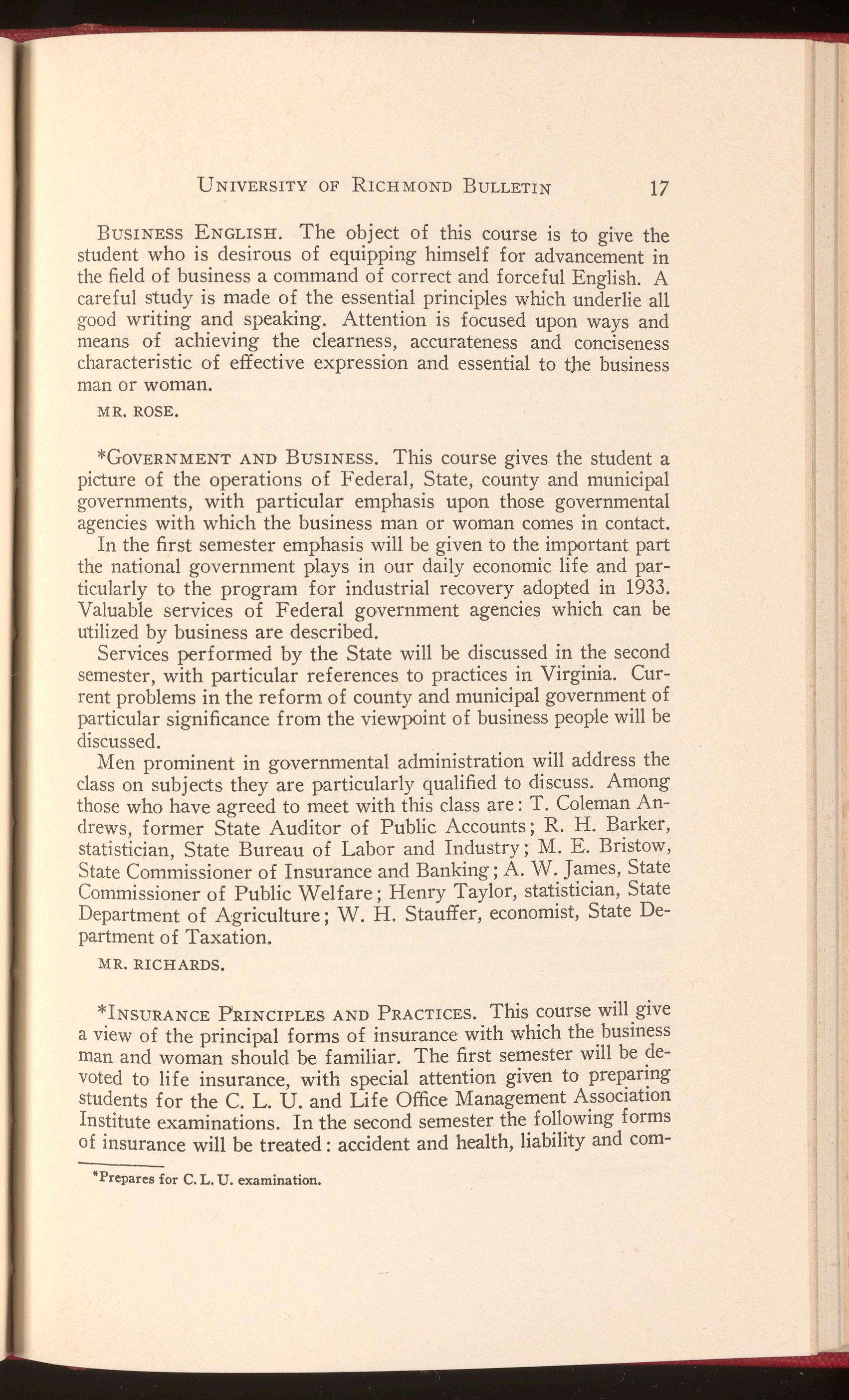
BusINESS ~NGL~SH. The o~je~t of _this course is to give the student who is desirous of eqmppmg himself for advancement in the field of business a command of correct and forceful English. A careful study is made of the essential principles which underlie all good writing ~nd_speaking. Attention is focused upon ways and means of achieving the clearness, accurateness and conciseness characteristic of effective expression and essential to the business man or woman.
MR.ROSE.
*GovERNMENTAND BUSINESS. This course gives the student a picture of the operations of Federal, State, county and municipal governments, with particular emphasis upon those governmental agencies with which the business man or woman comes in contact.
In the first semester emphasis will be given to the important part the national government plays in our daily economic life and particularly to the program for industrial recovery adopted in 1933. Valuable services of Federal government agencies which can be utilized by business are described.
Services performed by the State will be discussed in the second semester, with particular references to practices in Virginia. Current problems in the reform of county and municipal government of particular significance from the viewpoint of business people will be discussed.
Men prominent in governmental administration will address the class on subjects they are particularly qualified to discuss. Among those who have agreed to meet with this class are: T. Coleman Andrews, former State Auditor of Public Accounts; R. H. Barker, statistician, State Bureau of Labor and Industry; M. E. Bristow, State Commissioner of Insurance and Banking; A. W. James, State Commissioner of Public Welfare; Henry Taylor, statistician, State Department of Agriculture; W. H. Stauffer, economist, State Department of Taxation.
MR.RICHARDS.
*INSURANCEPRINCIPLESANDPRACTICES.This course will give a view of the principal forms of insurance with which the. business man and woman should be familiar. The first semester will be devoted to life insurance, with special attention given to prep_ar~ng students for the C. L. U. and Life Office Management Association Institute examinations. In the second semester the following forms of insurance will be treated: accident and health, liability and com-
*Prepares for C. L. U. examination.
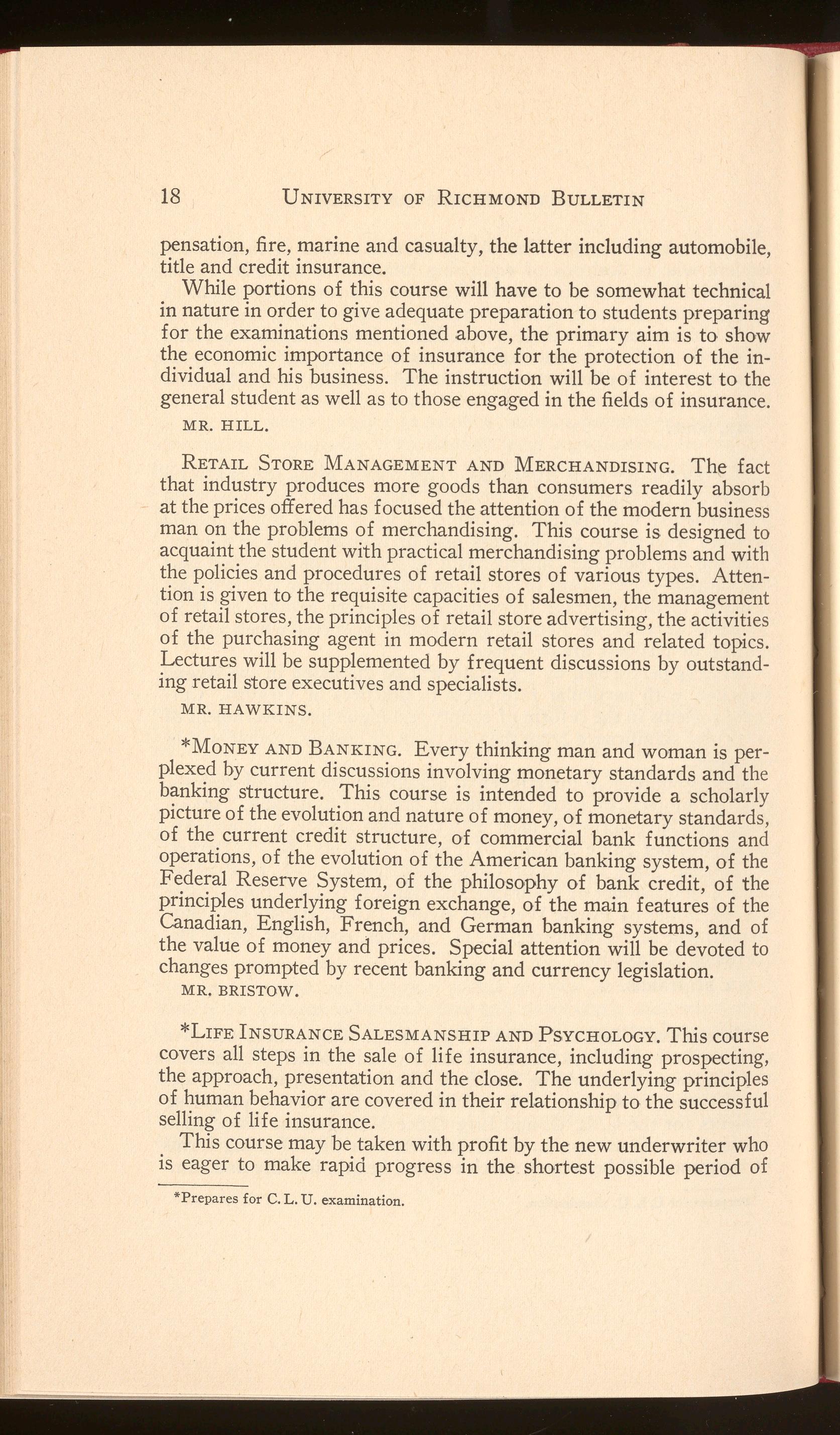
pensation, fire, marine and casualty, the latter including automobile, title and credit insurance.
While portions of this course will have to be somewhat technical in nature in order to give adequate preparation to students preparing for the examinations mentioned above, the primary aim is to show the economic importance of insurance for the protection of the in- dividual and his business. The instruction will be of interest to the general student as well as to those engaged in the fields of insurance.
MR.HILL.
RETAIL STOREMANAGEMENTAND MERCHANDISING.The fact that industry produces more goods than consumers readily absorb at the prices offered has focused the attention of the modern business man on the problems of merchandising . This course is designed to acquaint the student with practical merchandising problems and with the policies and procedures of retail stores of various types. Atten- tion is given to the requisite capacities of salesmen, the management of retail stores, the principles of retail store advertising, the activities of the purchasing agent in modern retail stores and related topics. Lectures will be supplemented by frequent discussions by outstand- ing retail store executives and specialists.
MR . HAWKINS.
*MONEYANDBANKING. Every thinking man and woman is per- plexed by current discussions involving monetary standards and the banking structure. This course is intended to provide a scholarly picture of the evolution and nature of money, of monetary standards , of the current credit structure, of commercial bank functions and operations, of the evolution of the American banking system, of the Federal Reserve System, of the philosophy of bank credit, of the principles underlying foreign exchange, of the main features of the Canadian, English, French, and German banking systems, and of the value of money and prices. Special attention will be devoted to changes prompted by recent banking and currency legislation.
MR.BRISTOW.
*LIFE INSURANCESALESMANSHIPANDPSYCHOLOGY.This course covers all steps in the sale of life insurance, including prospecting, the approach, presentation and the close. The underlying principles of human behavior are covered in their relationship to the successful selling of life insurance.
This course may be taken with profit by the new underwriter who is eager to make rapid progress in the shortest possible period of
*Prep ares for C. L. U examination
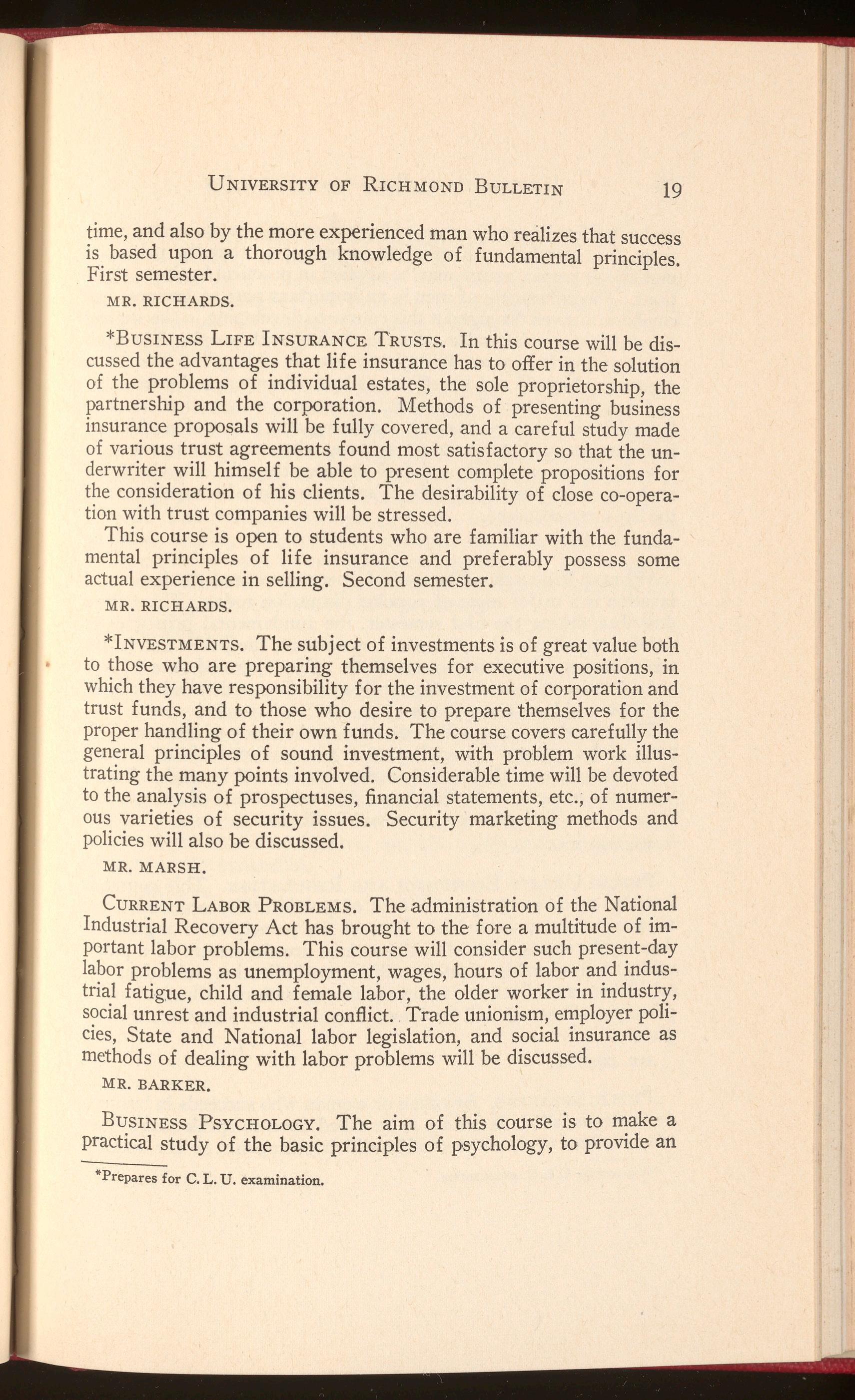
time, and also by the more experienced man who realizes that success is. based upon a thorough knowledge of fundamental principles. First semester.
MR.RICHARDS.
*BUSINESSLIFE INSURANCETRUSTS. In this course will be discussed the advantages that life insurance has to offer in the solution of the problems of individual estates, the sole proprietorship, the partnership and the corporation. Methods of presenting business insurance proposals will be fully covered, and a careful study made of various trust agreements found most satisfactory so that the underwriter will himself be able to present complete propositions for the consideration of his clients. The desirability of close co-operation with trust companies will be stressed.
This course is open to students who are familiar with the fundamental principles of life insurance and preferably possess some actual experience in selling. Second semester.
MR.RICHARDS.
*INVESTMENTS.The subject of investments is of great value both to those who are preparing themselves for executive positions, in which they have responsibility for the investment of corporation and trust funds, and to those who desire to prepare themselves for the proper handling of their own funds. The course covers carefully the general principles of sound investment, with problem work illustrating the many points involved. Considerable time will be devoted to the analysis of prospectuses, financial statements, etc., of numerous varieties of security issues. Security marketing methods and policies will also be discussed.
MR.MARSH.
CURRENTLABORPROBLEMS.The administration of the National Industrial Recovery Act has brought to the fore a multitude of important labor problems. This course will consider such present-day labor problems as unemployment, wages, hours of labor and industrial fatigue, child and female labor, the older worker in indust~, social unrest and industrial conflict. Trade unionism, employer pohcies, State and National labor legislation, and social insurance as methods of dealing with labor problems will be discussed.
MR.BARKER.
BUSINESSPSYCHOLOGY.The aim of this course is to make a practical study of the basic principles of psychology, to provide an
*Prepares for C. L. U. examination.

understanding of man's native and acquired equipment, mental functions, etc., together with sufficient technique so that the principles underlying human nature may be applied in practical business situations. The influencing of men is an important part of business and emphasis is given throughout this course to developing in the student the ability to get favorable action in dealing with people. The principles of psychology are brought to bear in aiding the student in organizing himself and his efforts to best advantage in business.
A practical study of sensation, perception, imag,ination, association of ideas, memory, instinct, reasoning and progressive thinking is undertaken with a view to considering why human beings in various situations, act, think and feel the way they do. Psychological analyses of advertising appeals, of salesmanship, of competition and the like are considered.
MR.ASTROP.
*PUBLICFINANCE. The cost of government and the burden of taxation is a major topic of popular discussion today. This course describes, during the first semester, the fundamental principles of public expenditures, taxation and tax systems, the public and industrial domains, administrative revenues, major types of taxes, financial administration and public credit and offers a detailed study of the State and local tax systems
The second semester will be devoted to the study of the same features of the national financial system. Comparisons of our tax and financial systems with those of other countries will be made. Recent legislative measures affecting expenditures of the Federal government and the Federal tax system will be discussed.
MR.THOMAS.
PUBLIC UTILITY EcoNOMICS AND REGULATION.This course is intended to cover the general field of public utility economics and to survey the economic basis for and the principles of regulation. Among the topics covered in this course are the nature of a public utility, the ownership of public utilities, capitalization, valuation, rate schedules, rate of return, taxation and regulations. Illustrations of principles discussed will be drawn from current situations in Virginia.
MR.CORSON.
PUBLICSPEAKING.Any man or woman who succeeds in business or professional life is certain to be called upon to speak many times when failure to do so creditably will handicap his or her success
*Prepares for C L U. examination.
~his course in the principles and practice_?f public speaking is designed to develop m the student the ability to speak effectively. Stress is laid upon a knowledge of the laws governing the logical presentation of materiai and emphasis is placed upon clear, scientific speech structure and cogent, persuasive delivery.
MR.AMBLER.
REAL ESTATE EcoNOMICS AND PRACTICES.This course is in-, tended to introduce the student to the economic principles underlying the many divisions and functions of the real estate business. Consideration will be given to the economic and legal peculiarities of land and the improvements on land a general knowledge of which is to advantage to both the general business man and the real estate practitioner. The course deals with problems connected with the sale, purchase, renting, development, management, financing, valuation, and taxation of each of several specialized types of real property. Prominent Richmond realtors will address the class on phases of this study in the practice of which they specialize.
MR. DESPORTES.
*SocIOLOGYIN BusINESS. This course provides a comprehensive, practical study of the underlying principles of present-day society for students of business. It treats of the social order, social contacts, social interaction, social forces, social control, the social basis of the state, collective behavior and social progress. Attention is given to modern business morals and customs, to the improvement of industrial relations, and to the social ethics of accounting, advertising, finance, marketing, etc. The course will include text-book assignments supplemented by lectures and the assignment of individual projects for investigation.
MR. HARLAN.

*Prepares for C. L. U. examination.
SCHEDULE, 1934-1935
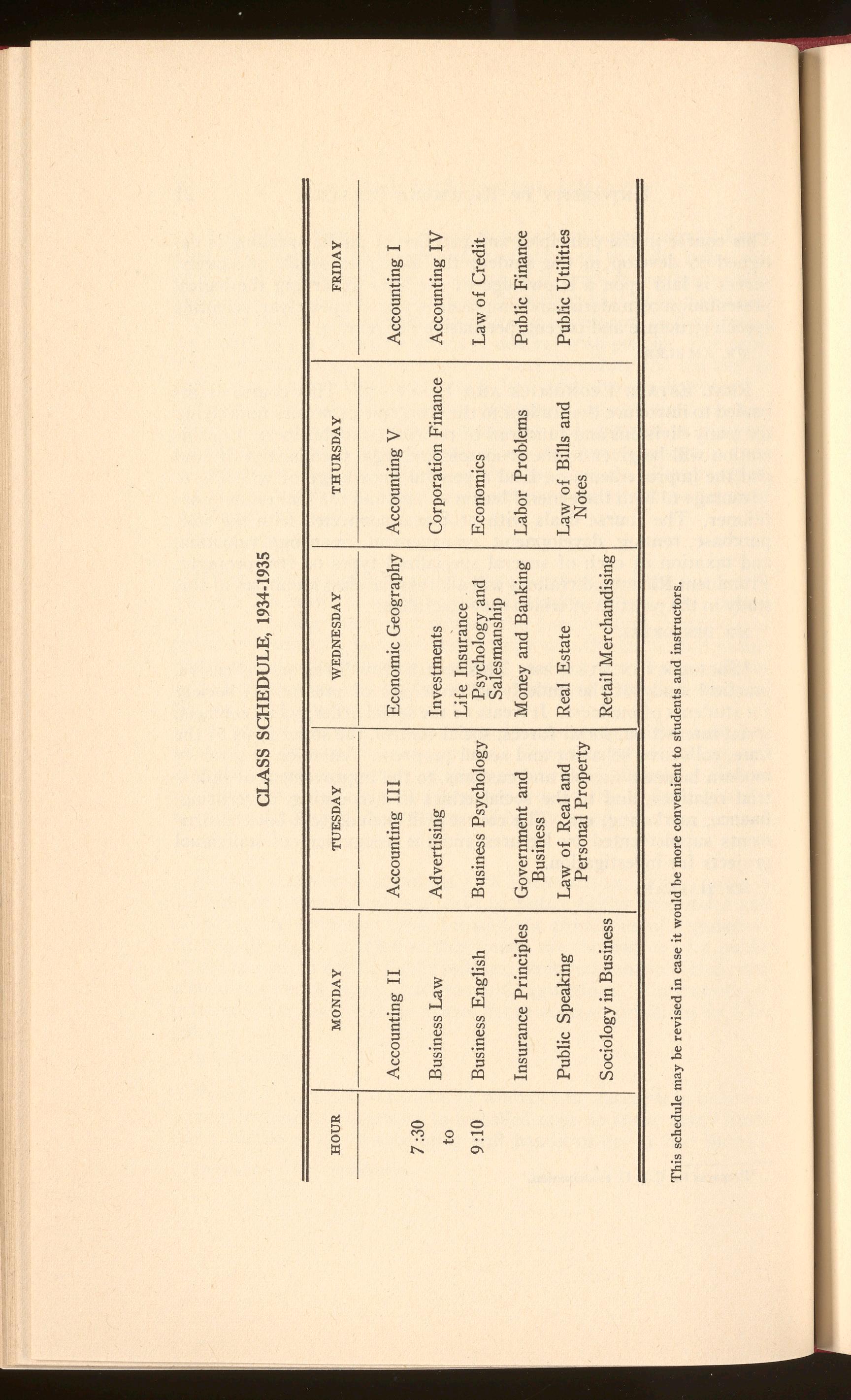
This schedule may be revised in case it would be more convenient to students and instructors





